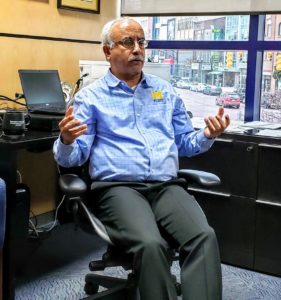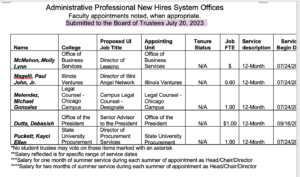By Jan Worth-Nelson
Debasish Dutta, chancellor of the University of Michigan – Flint since 2019, is leaving for the University of Illinois as special assistant to the president beginning Sept. 16 for a salary of $425,000.
University of Michigan President Santa J. Ono formally announced the departure July 18 in an open letter to the campus.
Perhaps the biggest news about the resignation, which seemed to take most UM – Flint faculty by surprise, is that Ono announced the campus’s almost year-long “Strategic Transformation” process aimed to address serious fiscal and academic issues on the downtown campus, will be put on pause while the search for a new chancellor begins.
“Chancellor Dutta has been a strong advocate for the UM-Flint campus even before he was appointed chancellor in the fall of 2019,” Ono wrote. “He accepted this key position knowing the challenges that lay ahead – even before the pandemic disrupted everything.
“He has maintained that commitment and strongly advocated for the transformation of the UM-Flint campus to better align the academic programs with the skills sought by employers throughout mid-Michigan,” Ono said. “I applaud him for this essential work that seeks to create new opportunities for UM-Flint students and the entire Flint community.”
Ono added he will work with university leadership to idenfify an interim chancellor as the national search for Dutta’s replacement gets underway.
“This transition also will require a pause in the transformation work that so many UM-Flint faculty, staff and students have helped to developed,” he said. “The Board of Regents and I remain firmly committed to a brighter future for the Flint campus. I want to assure you the transformation work will move forward once we have a new campus leader in place.”

UMF Chancellor Deba Dutta, PhD. (Photo by Tom Travis)
Dutta has been associated from his first arrival on campus with the Strategic Transformation process, a campaign imposed on UM – Flint by Ann Arbor administration in the face of many financial and institutional challenges at UM – Flint.
A range of severe problems propelled the process: a 30 percent enrollment drop — to fewer than 6,000 in 2020; a 35 percent graduation rate; and a $7.3 million budgetary deficit in 2021 — all understood to threaten the Flint regional UM campus.
Enrollment at UM – Flint was 5,985 in 2022, just under 6,000, down from 7,300 the year Dutta arrived, according to numbers provided by official UM sources.
An anonymous source inside UM – Flint reports enrollment for the upcoming fall semester are “the worst ever.” Sources who could confirm or clarify this on the record have not yet responded.
Dutta received a 15 percent raise for the 2022-23 fiscal year, bringing his yearly salary to $469,000, according to publicly available sources. On average, the rest of the Flint university faculty and staff received raises of about 3-5%. The overall University of Michigan pay raise for 2022-23, was 4.1%.

(Graphic source: www.umflint.edu)
His tenure has been marked by dissension and conflict, and his relationship with many faculty has been less than amiable.
A group of faculty, staff, students and alumni who call themselves the “people’s UM-Flint” to distinguish themselves from the official Strategic Transformation process held a series of town halls at which they strongly voiced concerns that the Strategic Transformation process was too “top-down,” privileges potential employers over students, neglects the actual needs of the Flint community, and emphasizes a business model at the expense of the liberal arts — long the UMF’s mainstay.
During public comments at an October meeting of the Board of Regents, the UM’s elected governing body, Susan Gano-Phillips, a tenured psychology professor for decades and for seven years dean of the UM-Flint’s College of Arts and Sciences before being fired, asserted numerous complaints have emerged — and been filed through official channels — about Dutta’s administration, alleging “discrimination, retaliation, dishonesty, coercion, bullying, and failure to engage in shared governance.”
The Strategic Transformation process kicked off last summer. As detailed in previous East Village Magazine stories, an Aug. 29 “charge letter” from then-interim UM president Mary Sue Coleman made it clear the situation was serious, and asserting minor adjustments would not be enough to “reverse any of these negative trends” on the Flint campus.
She said the need to implement bold changes was based on “a realistic description of the financial realities facing UM-Flint” provided to top UM management and the Board of Regents by Dutta, since his arrival as UM-Flint’s eighth Chancellor in August, 2019.
Coleman, who had come back to lead the university after the firing of former UM President Mark Schlissel, set a December, 2022 deadline for the plan to be completed.
She also wrote, “At the end of this study and with the approval of the President, a one-time financial investment (which will be dispersed as milestones are achieved) will be committed by the University.”
In the meantime, UM got a new president, Santa J. Ono, who took up the position in October. The UM hired Huron Consultants, a large international business consultation firm based in Chicago, to organize and run the Strategic Transformation process on the Flint campus.
The hiring of Huron was controversial, with a group of faculty noting that Huron’s work on other campuses nationwide led to severe budget and program cuts, with particular slashes to the liberal arts and humanities.
UM – Flint under Dutta’s leadership missed the deadlines Coleman had originally proposed. The Strategic Transformation process was divided into two halves — the academic side and the student services side. The former, following months of meetings and analyses by the Huron group, was said to have wrapped up in early spring, with the student services analyses immediately following. But announcements as to the results of that study have been few and far between with even those on campus unclear and uncertain about what was happening or about to happen.
Recent requests from EVM for followup on the Strategic Transformation process and outcomes were given a one-sentence response by UM – Flint Director of Marketing and Communications Robb King, who referred a reporter to Dutta’s May 26 message to the campus. It is the most recent communique posted on the Strategic Transformation website, and in it Dutta offered few specifics about decisions made so far. He stated,
“While the process has taken longer than initially anticipated, it is better to be thorough and deliberate rather than simply adhering to a date on the calendar. That being said, those involved with the day-to-day oversight of the project understand and appreciate why we are taking our time: because we need to get it right.”
He added, “As we shared in March, part one of the initiative resulted in several proposals for expanding current academic programs due to market opportunities, and recommendations for new academic programs. I am currently engaged in discussions about those with President Ono and the Regents.
“In the coming weeks, I will discuss with President Ono and the Regents part two of our work, which considers academic services, including improving student services and refining related processes. They will consider the totality of the projects, the timeline and targets for the implementation, as well as the funds necessary.”
Morale has reportedly plunged among the UM – Flint faculty, particularly those in the College of Arts and Sciences (CAS), especially after Gano-Phillps was fired last summer and several CAS departments abruptly moved out of the unit and into the new College of Innovation and Technology (CIT). Several remaining departments, including English, were folded into one new one chaired by a communications professor in a move perceived as deprioritizing one of the former powerhouses of the University’s academic units.

Student and Faculty protestors in the wake of news the Board of Regents may slash humanities at the Flint campus, Fall 2022. (Photo by Tom Travis)
Significantly, this spring, UM – Flint tenured and tenure-track faculty organized themselves into a union, joining the American Federation of Teachers/American Association of University Professors (AFT-AAUP). In June, the organizers of the union issued a statement expressing concern “regarding ongoing austerity and possible investment on the UM – Flint campus, especially in light of pledges of investment in UM – Flint that remain as yet unfulfilled.”
In fact, the rumored and promised “one time financial investment,” said to be $100 million, has not materialized, sources say.
In the statement, faculty decried the lack of transparency and uncertainty about crucial campus issues, with particular concerns about what seems to be a push toward austerity. “…It is impossible to plan for the future when basic questions regarding what resources will be made available remain shrouded in secrecy,” they stated.
“Many faculty and staff feel frustrated and isolated knowing that a transformation is imminent, but without yet having a clear sense of the vision guiding this transformation or how our voices have informed it. Further, while there is interest in building new programs, no financial commitment has yet been made to address long-standing infrastructural issues such as concerns over our university website, a marketing plan, or updating and maintaining our IT resources.”
The full text of the faculty statement is attached below.
The departure contrasts with a more positive picture offered by Dutta in a December interview with EVM.
The University of Michigan – Flint is “a beacon of hope” for the Flint community, he declared, adding he intended to keep it that way.
“I am committed to doing everything I can do to make the UM – Flint strong — financially strong, programmatically strong, and relevant to the region, its employers and so on,” he said then.
“Let’s be honest here,” he said at the time. “I’m trying to turn this place around. I didn’t create this mess…I did not. I came in August of ’19, opened the books, found a mess, and said, oh my God, let’s try to fix it…”
Dutta, who holds a Ph.D. from Purdue University and spent 20 years at UM – Ann Arbor as a mechanical engineering professor, came to Flint after one year at Rutgers University – New Brunswick, where he was chancellor. Before that, he was provost and executive vice president of academic affairs and diversity at Purdue University. Before that, he was at the University of Illinois–Champaign-Urbana, where he was associate provost and dean of the graduate program.

UM–Flint Chancellor Debasish Dutta, PhD. (Photo by Tom Travis)
He has a long familiarity with Flint; his wife, Fataneh Taghaboni-Dutta, Ph.D., was a faculty member of UM-Flint for nearly 20 years.
At least one faculty source who has been very involved in the Strategic Transformation process said the news caught him by surprise, commenting, “Wow. I am speechless.”
Another source declining to be identified asked to speculate on the news, said, “This is him getting out on purpose. He failed.”
Questions posed by EVM which received no specific reply other than referral to Dutta’s May 26 message were the following:
Statement of the UMF AFT-AAUP Organizing Committee Regarding Ongoing Austerity and Possible Investment on the UM-Flint Campus
The Organizing Committee of the UMF AFT-AAUP wishes to express its concern regarding ongoing austerity on the UM-Flint campus, especially in light of pledges of investment at UM-Flint that remain as yet unfulfilled.
Beginning in the Fall 2022 semester, university officials have regularly suggested that a large investment is forthcoming for the UM-Flint campus. Throughout the campus “Transformation” process overseen by UM-Flint Chancellor Debasish Dutta, campus partners have been asked to suggest transformative projects, under the implicit (and sometimes explicit) understanding that there will be money to support at least some of these ideas. Indeed, the Detroit Free Press reported in February 2023 that this investment is likely to be up to $100 million.
We have and continue to be hopeful that such investments will be made on our campus, and that these investments will be made in a manner that supports all of our campus’ stakeholders in their work fulfilling UM-Flint’s mission. However, given that it has been nine months since the original news of this possible investment (at a September meeting of the UM-Flint Faculty Senate), and nearly six months since the originally-scheduled end date of the campus transformation process, we are concerned that this investment is being indefinitely deferred.
Further, as we have waited to learn details about this investment, austerity has continued, with many deleterious effects. Faculty and staff morale is low; collaboration is increasingly difficult as individuals and units jockey for resources; consequential decisions, ranging from program reorganizations to workload-related policies, are being made under assumptions of continuing resource scarcity; and rumors of program closures and layoffs circulate regularly.
Perhaps most importantly, it is impossible to plan for the future when basic questions regarding what resources will be made available remain shrouded in secrecy. Many faculty and staff feel frustrated and isolated knowing that a transformation is imminent, but without yet having a clear sense of the vision guiding this transformation or how our voices have informed it. Further, while there is interest in building new programs, no financial commitment has yet been made to address long-standing infrastructural issues such as concerns over our university website, a marketing plan, or updating and maintaining our IT resources.
All of this pits faculty, as well as staff, against each other, devaluing and disempowering UM-Flint’s most valuable resource, i.e., those who labor on our campus.
In light of this, we urge the UM Board of Regents, UM President Santa Ono, and the UM-Flint administration to end this atmosphere of austerity through: a) moving quickly to announce and implement the aforementioned investments; b) increasing transparency about these investments and the vision guiding them; and c) ensuring that these investments support the work of all UM-Flint stakeholders, allowing us to work together in partnership for the betterment of our campus and the public good mission that it serves.
Documentation of Dutta appointment pending at University of Illinois:

University of Illinois appointments list for trustees
EVM Consulting Editor Jan Worth-Nelson can be reached at janworth1118@gmail.com.


You must be logged in to post a comment.